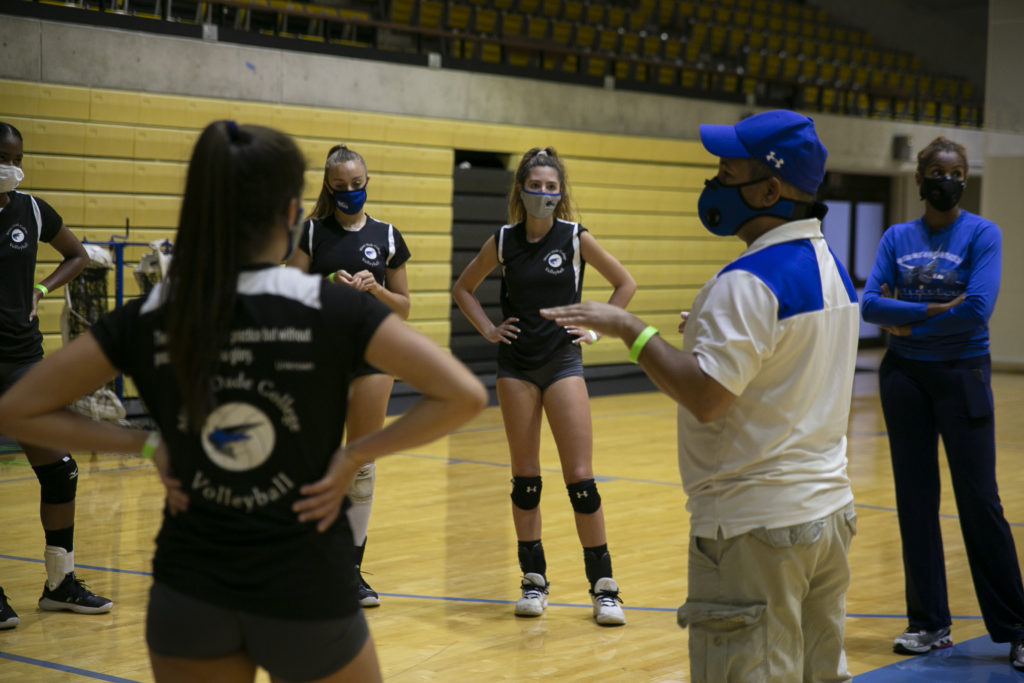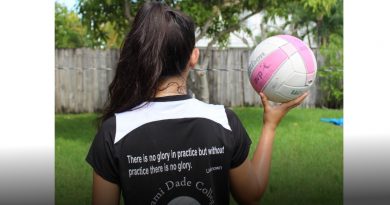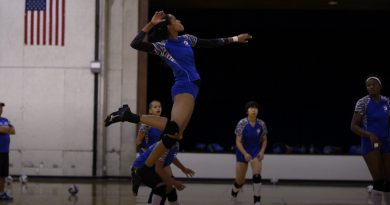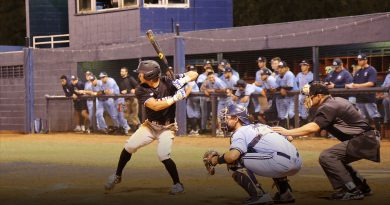One Year Ago Today, MDC Shuttered Its Doors Amid The Coronavirus Pandemic
It’s hard to believe it has been a year since COVID-19 upended our lives.
On March 11, with 118,000 positive cases worldwide, the World Health Organization declared the coronavirus a global pandemic.
The following day, the Medical Campus was shut down after a Brazilian official who visited tested positive for the coronavirus. A few hours later, West Campus closed after a student reported being diagnosed with a non-threatening strain of the virus.
By the end of the day, students from all eight campuses were sent home and classes were canceled for two weeks as the College transitioned to remote learning.
“As soon as I got that message, I immediately went to hunt down masks, hand sanitizer, vitamins, water and toilet paper,” said Medical Campus student Andy Garcia, who got the email announcing the canceling of classes while he was on his way to take an exam.
Four days later, on March 16—exactly one year ago—employees were sent home and the College shuttered its doors at all eight campuses.
“The way we do things has changed forever,” said Anthony Valenzuela, who serves as president of the Kendall Campus Student Government Association.
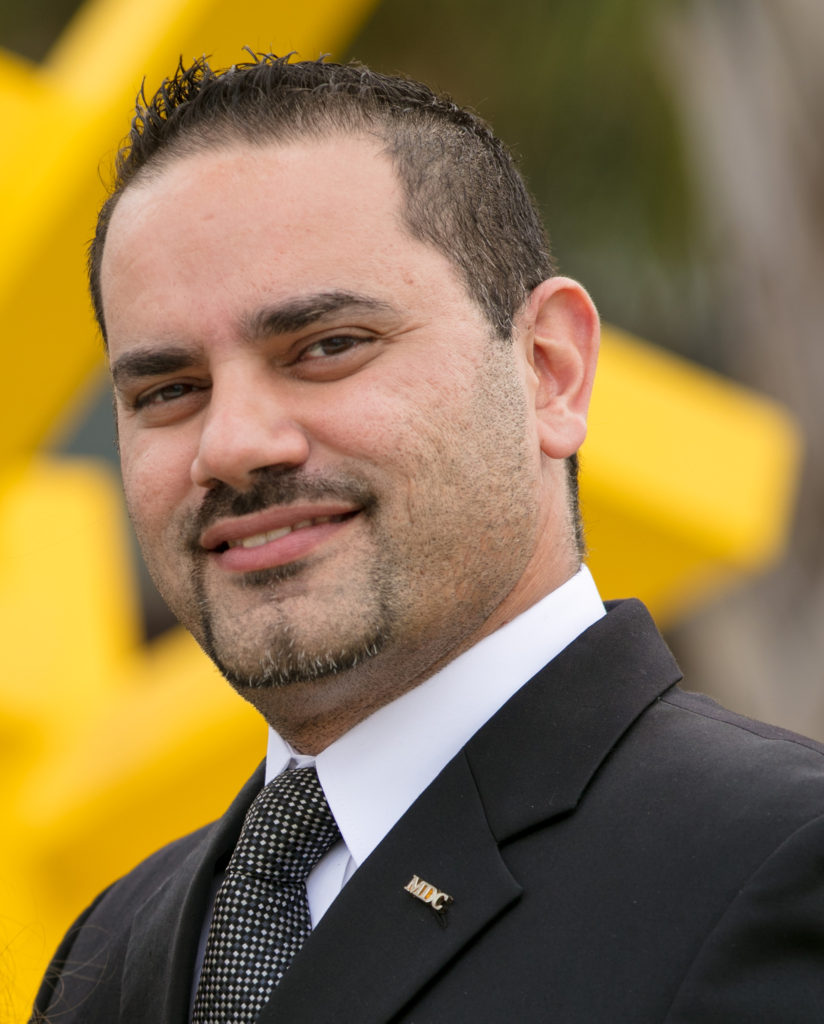
Yakir Fernandez, who serves as Miami Dade College’s Director of Emergency Management, started preparing for the possibility of the College going into lockdown in January. He used the school’s hurricane response as a framework.
In February, the College implemented enhanced cleaning protocols. They chose what chemicals to use and trained custodians on how to properly use them.
“The only thing I could do was plan for the worst,” Fernandez said. “A lot of healthcare workers didn’t know what this virus was so we had to make decisions for the health and wellbeing of our students.”
Between March 13-29, the College canceled classes. On March 30, students transitioned to online classes with the use of remote learning platforms like Zoom and Blackboard, and communicated with professors mostly via email.
The initial plan was to return to in-person classes in the Summer 2020 semester. However—with the pandemic still going strong—the College only allowed a small number of students to take in-person instruction for classes that couldn’t be replicated virtually.
Students taking blended courses returned to in-person classes on Sept. 28 on a limited basis. People entering the campuses must go through temperature checkpoints and are required to wear a face mask at all times. Social distancing is practiced inside classrooms.
In-Person Programs
The School of Entertainment & Design Technology was one of the few programs that remained in-person during the summer.
Equipment that is checked out now includes digital thermometers and disinfectant wipes and everything must be sanitized after each use. In addition, course syllabi now include an addendum that outlines the industry-standard protocols that must be followed while on set.
“Film and television production are very social-oriented types of activities,” said SEDT Chairperson Barry Gordon. “All faculty and staff are very proud of the fact that students have been able to continue progressing toward completing their degree programs without stepping out.”
To accommodate students working in smaller cohorts, more equipment has been added to SEDT’s inventory.
Students also missed out on their annual film screening where they showcase the work they do throughout the year. It has since become a virtual showcase.
Domenicca Botero, a SEDT student majoring in film and digital production, has struggled to complete her thesis project. She says that part of her project’s budget had to be allocated to materials strictly used for sanitation and safety, schedules could not overlap because of cohort size restrictions, and portions of the script had to be rewritten to better fit current circumstances.
“The process of filmmaking during this time was very stressful and uncertain,” Botero said. “It was a period of adaptability and necessity [that] made us think more creatively.”
The School of Justice—another program that remained in person—allowed for social distancing by using the conference center in building 9 at North Campus as a classroom. Only 36 students are allowed in the center at a time, so classes are split into two sessions.
“It’s difficult to be in a classroom and trying to split your time as a professor to make sure those in front of you are actually being engaged as well as those who are online,” said criminal justice professor Nancy Alleyne.
The Miami Fashion Institute at MDC has also reduced machinery access to students. The institute has taken away the use of the Fashion Lab—a workspace with worktables, mannequins, dress forms, and machinery—during class time. Students must schedule an appointment in advance to complete their classwork because many don’t have the necessary equipment at home.
Medical Campus reopened its doors on June 1 to teach health science programs face-to-face. Classrooms are sanitized in between sessions.
The campus has also made an effort to help the community during the pandemic. Last April, they loaned 17 ventilators to Jackson Memorial Hospital. They also discussed the possibility of having students and faculty in the medical assistant, physician assistant and nursing programs help administer the COVID-19 vaccines.
“When we go through a hurricane, it doesn’t impact the country [but] this pandemic has affected everyone,” said campus President Bryan Stewart, who said he was forced to quarantine for two weeks after the Medical Campus was exposed to someone with COVID-19 back in March. “The realization that we will remain in history long after we are gone has been eye-opening.”
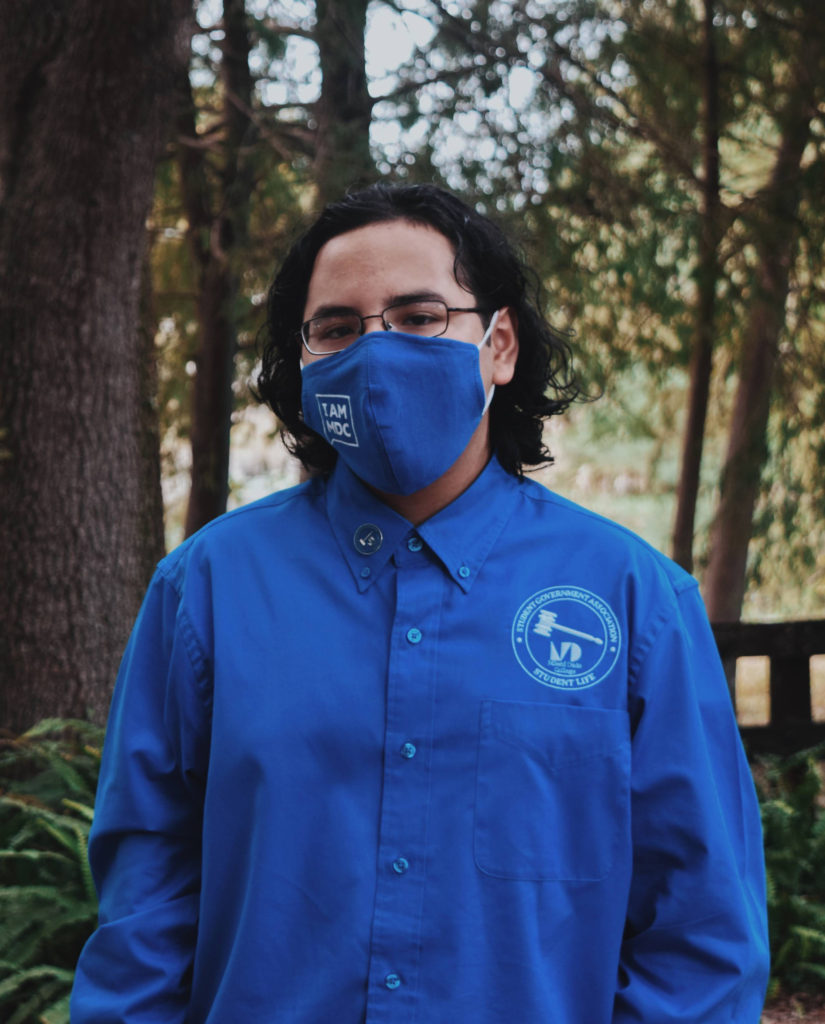
Students Impacted
Student organizations have also struggled to adapt to the pandemic.
The Student Government Association at North Campus had more than 115 members before the pandemic, making it the second most active branch at the College. However, the pandemic has hampered participation.
“My biggest challenge has been getting people to come to the table,” said North Campus SGA President Michael Cruz. “Before the pandemic, we always had people in the SGA office, in the recreational room playing video games or in the cafeteria. There were people socializing but the pandemic has completely killed us.”
Collegewide, the organization has tried to weather the storm by hosting food and mask distributions, virtual mental health discussions, webinars about racial injustice, drive-in movie theater events and more.
“Students are going through one of the hardest times,” Valenzuela said. “Whether that is the loss of jobs, family members, mental health issues or the confusion this pandemic has presented to all of us.”
Students at The Reporter have also dealt with the consequences of the coronavirus.
On March 10, a small group of staff members boarded a plane to attend the ACP/CMA Spring National College Media Convention in New York City. Minutes before takeoff, the College informed them the pandemic was spreading quickly and they no longer had permission to travel. Their luggage made it to New York but they never did.
However, a few days later, the staff realized how serious things were when they learned that some conference attendees reported testing positive for the coronavirus.
Back home, the paper had to stop printing physical copies—which are distributed across the campuses—that March. For the first few months, photographers could not take photos and interviews moved almost entirely virtually or on the phone.
The staff now holds gatherings using Google Meet and news is delivered through a bi-weekly newsletter, the Reporter website and social media.
Athletics also faced challenges. The baseball and softball teams had their seasons cut short last year because of COVID-19. Recruiting for all teams this summer was done virtually and no one was allowed to practice until September.
Teams returned to action this spring but fans were not allowed in the stands at MDC home games until a few weeks ago.
Looking Forward
Madeline Pumariega, who started as president of MDC in January, has made it a point to provide students and staff with the resources they need to get through the pandemic.
On Jan. 20, the North and Kendall campuses became testing sites for the coronavirus thanks to an agreement with Curative, an organization that provides tests to produce data for health officials. The Homestead Campus followed suit on March 10.
The College also worked out a deal that makes it possible for its employees who are 65 and older to get the COVID-19 vaccine through the Jackson Memorial Health System. And on March 3, North Campus became the first federal vaccination site in South Florida, giving 5,000 vaccinations per day.
The pandemic caused a steep decrease in enrollment at MDC, with the school reporting a 16 percent decline at the start of the Fall 2020 semester. The College has slowly made its way back—enrollment for the spring semester was down by only 6.5 percent on March 8.
To make classes more engaging, the College launched a new teaching modality—MDC Live—that offers synchronous virtual classes.
“To move onto Phase 3, data and science is what will determine it,” Pumeriega said. “Listening to students and our faculty is also important as we put plans for the fall term and implement additional learning support to help them be successful.”
This summer, MDC will remain in Phase 2. It’s unclear if classes will be fully in-person this fall, but what is clear is that when students return, nothing will be the same.
“We will not return higher education to where we were before COVID,” Stewart said.
